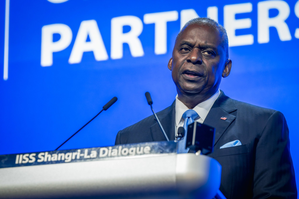America
Worries over China's influence prompt US Defence Secretary to visit Cambodia

Cambodia June 5th:
US Defence Secretary Lloyd Austin is currently in Cambodia, meeting with the prime minister and defence minister. This visit is seen as a sign of increasing concern in Washington with China's increasing influence in the area, according to CNN. On Tuesday, Austin will make his second trip to Cambodia as secretary of defence. However, this is the first time a US defence chief has flown to Cambodia with the express purpose of holding a bilateral discussion with his counterpart, Tea Seiha, in the defence ministry. According to defence officials, the outreach shows that the US wants to improve relations with Cambodia, especially since Beijing's influence over the country has been steadily increasing over the past few years.
During a press conference, a senior defence official expressed optimism about the prospects for a more positive and hopeful future between the two countries. The official was referring to Cambodian Prime Minister Hun Manet, who assumed office last year after his father Hun Sen's nearly four-decade rule. "This isn't a visit that is about significant deliverables and achievements."
Diplomatic efforts aside, there are real worries about China's increasing influence at Cambodia's Ream Naval Base. The US is concerned about the funding and operations of the base, which is strategically located near the South China Sea, according to Austin. The deployment of Chinese warships in December caused concern in Washington, despite Cambodian officials' claims that the base will not be used as a foreign naval outpost.
U.S. and Indo-Pacific partners have firmly condemned China's territorial claims in the South China Sea. Attacks on Philippine ships and military exercises near Taiwan highlight Beijing's coercive tactics, which has the United States worried that China may set up a military station near important waterways.Tensions have arisen between Washington and Phnom Penh as a result of China and Cambodia's confirmed military collaboration. As a result of these tensions, Cambodia cancelled military drills with the US in 2017 and in 2020, it demolished a US-built facility at Ream. Sanctions imposed on Cambodian people by the Biden administration last year in reaction to fraudulent elections further soured bilateral ties.
During his time in Phnom Penh, Austin met with Cambodian and US defence officials to discuss ways to further their partnership in disaster relief, UN peacekeeping, and military training and education. During the conversations, both sides emphasised their desire to strengthen regional security and peace while also understanding the challenges posed by China's assertive policies in the Indo-Pacific area. After attending the Shangri-La Dialogue in Singapore, Austin's trip to Cambodia brings him to the end of a longer Asian journey. While speaking at this gathering, he warned of China's aggressive regional policies and emphasised the need to strengthen relationships with important Asian allies in order to resist Beijing's aggression.
Austin spoke with China's defence minister, Dong Jun, and reaffirmed the United States' dedication to keeping lines of communication open in the military in order to reduce miscommunication and avoid escalation. A senior US official pointed out that China's forceful actions across the area were at contrast with Dong's later address, which condemned external intervention and emphasised Beijing's perceived strength.



































